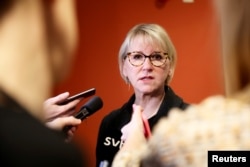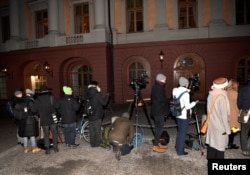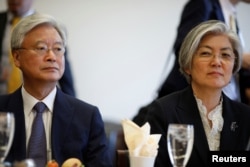Three days of talks between North Korean and Swedish foreign ministers concluded Saturday, sessions that could lead to a meeting between U.S. President Donald Trump and North Korean leader Kim Jong Un.
On Friday, Swedish U.N. Ambassador Olof Skoog said his country was trying to help de-escalate tensions on the Korean Peninsula by hosting the talks. Sweden is one of the few Western powers to have an embassy in Pyongyang. There, it provides diplomatic services for not only Swedes but also for U.S., Canadian and Australian citizens.
"The security situation on the peninsula is one of the most pressing issues on the world agenda right now, and if Sweden can play a part in de-escalation there, this is what we're trying to do," Skoog told reporters in New York.
North Korean Foreign Minister Ri Yong Ho and Swedish Prime Minister Stefan Lofven met briefly in Stockholm on Friday, but Skoog and Lofven's spokesman would not disclose what the two officials discussed.
Skoog added, however, the talks in Stockholm would "hopefully" help "create a good environment for such a meeting." He declined to comment when asked whether Sweden would host a meeting of the U.S. and North Korean leaders.
"We just want to be helpful in pursuing a de-escalation on the peninsula," he said.
The majority of Ri's time was spent with Swedish Foreign Minister Margot Wallstrom. At the conclusion of the talks, Sweden's Foreign Ministry released a statement saying Wallstrom emphasized to the North Korean official "the need for North Korea to dismantle its nuclear arms and missiles program in line with several [U.N.] Security Council resolutions."
The statement also said the two officials discussed "opportunities and challenges for continued diplomatic efforts."
‘Cautious optimism’
U.S. President Donald Trump reaffirmed his plan to meet by the end of May with North Korean leader Kim Jong Un to negotiate Pyongyang's nuclear program, the White House said Friday. In a phone call with South Korean President Moon Jae-in, Trump expressed "cautious optimism" over recent developments regarding North Korea.
The White House said the two leaders discussed preparations for their upcoming negotiations with North Korea and agreed "concrete actions, not words" were key to any denuclearization of the Korean Peninsula. North Korea, however, has not officially confirmed the meeting and no specific time or venue has been set.
South Korea’s senior press secretary Yoon Young-chan said Moon pledged to “create an atmosphere for the successful opening of the U.S.-North Korean summit” when he meets with the North Korean leader in April.
South Korea said Moon also talked by phone Friday with Japanese Prime Minister Shinzo Abe, who expressed the possibility of having a North Korea-Japan dialogue. A South Korean spokesman said the two leaders agreed to strengthen their cooperation to work together and with the United States to bring about the denuclearization of North Korea.
Earlier, Im Jong-seok, Moon's chief of staff, said South Korea is seeking high-level talks this month with North Korea to prepare for the inter-Korea summit in April. He also said Moon could meet with Trump after the inter-Korea summit, but before Trump holds his planned meeting with the North Korean leader in May.
"We've decided to narrow down the agenda topics to denuclearizing the Korean peninsula, securing permanent peace to ease military tension, and new, bold ways to take inter-Korean relations forward," Im, the head of South Korea's summit preparation team, told reporters.
‘Global maximum pressure’
The upcoming summits also were discussed Friday in Washington by the top diplomats from South Korea, Japan and the U.S.
South Korean Foreign Minister Kang Kyung-wha and her Japanese counterpart, Taro Kono, met separately with U.S. Deputy Secretary of State John Sullivan, who is serving as acting secretary of state after Rex Tillerson was fired by Trump earlier this week.
Sullivan's meeting with Kono affirmed the importance of the U.S.-Japan alliance in the East Asian region, State Department spokesperson Heather Nauert said.
Nauert said both countries agreed "global maximum pressure" must continue to be applied on Pyongyang until it takes "credible, verifiable and concrete steps toward denuclearization."
Sullivan said he was “delighted to welcome” Kang to the State Department to continue to “forge the strong bonds that we have between the United States and South Korea.”
Trump has chosen CIA Director Mike Pompeo to replace Tillerson, but Pompeo is not able to have formal contacts with the foreign ministers of the two Koreas until his nomination is approved by the Senate.








